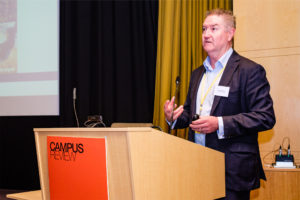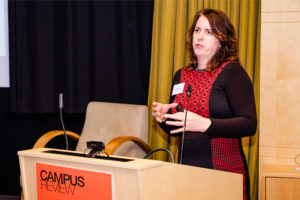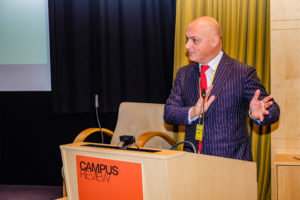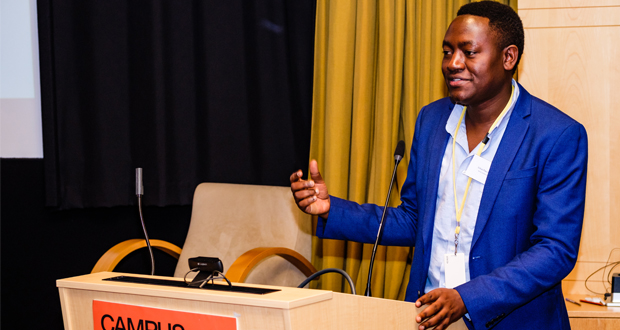There was controversy before Campus Review's latest conference, 'Cash cows or human capital? Perspectives on international students in Australia', began. "The title of this conference is offensive to international students and to the staff who teach and look after them," an ECU academic protested, via email, a month in advance.
However, the tone of the event, held on Wednesday in Sydney, was largely harmonious. Its takeaways? We can and need to do better to retain the flow of international students, if this is even necessarily a good thing.
Something to celebrate ?
Maybe the ECU academic misinterpreted the phrase 'cash cows', but there's no denying its veracity: according to presenter Aleksandr Voninski, UNSW and the University of Sydney alone make $1 billion a year from international students. But, before he expounded on his topic, 'push/pull factors in international higher education', the first presenter, StudyNSW Director Peter Mackey celebrated the upsides of hosting international students down under.
Mackey, who leads the NSW government unit responsible for delivering the state's international education strategy, outlined the short and long-term gains offered by international students. Yes, they increasingly bring in cash – 21 per cent more than they did in 2016 – but they also shore up international relations. Next year will be the 40th anniversary of the NSW-Guangdong Sister State agreement, which laid the foundations for NSW being the top Australian destination for overseas students.
International students like Sumiya Sultan, the 2016 NSW International Student of the Year, created initiatives like Women in Science and Engineering (WISE) at Macquarie University. Then, there are community and staff-led programs that benefit international students and other alike, such as the University of Wollongong (UoW)'s Illawarra Committee for International Students, which links retirees with international students to manage isolation on both ends.

Peter Mackey
'Interchange' was particularly well-received by conference attendees and presenters. Mackey, who previously worked in Hanoi and Singapore, illustrated how the inter-NSW university entrepreneurship-building program provides international studies with a cherry on top of their usual learning.
"Offshore education experience is more valued in Asia even if students have poorer grades, as it inculcates soft skills like the ability to challenge authority.
"We are making a contribution to human capital when they return home," Mackey said.
Ultimately, he said despite hefty profits from overseas students, it is impossible to know their true value, as, if they have a great experience, "it can build connections to Australia for generations".
Crumbs of emotional truth
Despite statistics and the media reporting booming international student numbers, presenter Ruby Biscuit sees possible storm clouds ahead. The Director of pathways provider Macquarie University International College said such providers are 'canaries in the coal mine’ for what's coming to universities, and many nationally are starting to see a drop in enrolments from China. This is sobering, given over a third of international students in Australia, the largest contingent, are Chinese.
Assuming the sector wants to rectify this, Biscuit suggested emotion-centric ways of doing so. "We are forgetting the high levels of emotion attached to decision making," she said. "That’s what empowers international students."
Referencing Visible Learning creator John Hattie, she noted that an 'environment that supports self-belief' is the greatest contributor to learning. Within this, the foremost relationship is the student-teacher one. So, university lecturers may wish to consider this in their interactions with international, and, for that matter, all students.
One way of achieving this is through cultural competence training. Although Biscuit thinks our attitudes our fine, she said our skills and knowledge need work.
"We need more proactive programs, particularly for domestic students," she said. An example of a useful skill to teach both students and staff is how to use graded (simplified) language when communicating with international students.

Ruby Biscuit
In a survey conducted by her College, international students reported nerves around speaking English and shyness as barriers to interaction with domestic students, who in turn lamented international students' lack of participation in team work.
Yet there were also positive intercultural interaction examples. Domestic students praised international students' maths skills, while a Pakistani student, who saw media reports about Australia before he arrived here, said that it was less racist than he expected.
"I think we are at cultural turning point, moving from egocentrism to allocentrism, where we don't think of our institutions as the dominant culture, but as housing a collective of cultures, exchanging equally," Biscuit surmised.
"Intercultural communication skills will set us apart [from other countries]."
From the student's mouth
"My accent used to be thicker", presenter, 23-year-old Tanzanian international student Linus Faustin, laughed. He relayed a story about how when he first arrived in Australia and scored a job at his accommodation, Urban Nest, he was too scared to pick up the phone as no-one could understand him.
Presenting on his experiences as an international student at UTS, where he gained an undergraduate Communications degree, and now Bond University, where he is studying a Masters in Construction, his candour struck the audience.
"If you're [an] international student, obviously you want to study and you want a job as well. Agents, don't send kids to Queensland, trust me," he said, to groans from USQ and Bond audience members.
While he thrived at UTS, even winning the '2017 NSW International Student of the Year' title, times are tougher for him at Bond. "For the first five weeks, I was struggling. I was on my own in my room, or in class, or spending my nights in the library. I was falling apart.
"Everyone is from China and they have their own small groups, they don't talk to anyone [else]. The people that I met were all first years. I'm like, 'Oh, where are all the 23-year-olds?'"
As he was missing classes and his grades were plummeting, his teachers realised something was wrong, and referred him to university counselling services.
By contrast, at UTS, despite a language barrier, he "had the best time of [his] life". He was so involved in university life he was elected Vice-President of the board of student services body ActivateUTS.
Though Bond isn't all bad for him. He said he has a closer connection to his teachers there than at UTS. "I like the degree, I like the teachers, but I wish they would ship me back to where I was before," he admitted.
His bigger picture
Being so involved in international student life gave Linus a broader perspective on the issues they face. "Mental health is a huge one," he said. "I'm pretty sure if you are from [a] third world country, when you say you have mental health issues, that means you are weak ... For us, when you are growing up, you are taught to strive."
Then there is, like Biscuit suggested, a need for further cross-cultural training. Linus gave an example of this from his perspective. In his culture, winking symbolises friendliness, whereas in Western countries, it signals flirtation.
"The Respect. Now. Always. Campaign – I think you guys need to push this message to many international students because when you read some of the incidents in that report, to other countries [that behaviour is normal," he said.
Constant communication with international students is another of Linus' suggestions for universities. At UTS, communications, delivered via social media by and for international students, occur on a daily basis.
As he found it extremely difficult to find employment, he recommended additional university support for this. At UTS, for instance, the careers office negotiates with companies to specifically take on international students.
He also offered advice to student recruitment agents: "Tell students, especially if you are doing undergrad, on your first year of uni it's okay if you don't get a job, but just do lots of unpaid jobs because you need to build your resume, you need to build connections. That's what I did."
Finally, despite them being competitors, he urged universities to work together for the greater, international student good. "At university, they keep saying they are the best in what they do – more than another university. I'm like, 'No, you are not, because you aren't seeing what other universities are doing.'"
'The golden age is yet to come'
Alex Frino sympathised with Faustin. As a first-in-family international student studying in England, he struggled. Now, as UoW's Deputy Vice-Chancellor (Global Strategy), he's not only overcome his past, but he's extraordinarily optimistic about the future. That is, when it comes to international student numbers.
An economist and former investment banker, after number-crunching, he forecast that the "growth we've seen in the last 10 years is nothing compared to what we will see in the next 10".
He gained faith in his predictions after forecasting growth in 2016 – which eventuated. International student numbers have increased by an average of 6 per cent per year since 2008. By the end of this year, Frino thinks they will total 400,000. By 2028, he thinks they could reach 760,000. Driving this will be the continued turmoil stirred by Donald Trump's presidency and Brexit, he presaged.
Further, regardless of China's travel warnings about Australia, issued in December and February, "we've had a bumper year this year" in relation to Chinese students. Chinese student numbers grew by 11 to 12 per cent. Added to that, its economy is the second-fastest growing in the world. India, the fastest, is Australia's second-largest source country for international students.
Still, do we need to diversify beyond our two largest source countries, which together account for nearly two-thirds of enrolments? Frino doesn't think so. "It costs money," he said.

Alex Frino
Golden age not so glittering?
Or, much to university management's distaste, perhaps we shouldn't grow at all. Audience members from the NSW Department of Health and Monash University's Faculty of Health raised the issue of too many students and not enough (course-mandated) industry placements. People seemed to agree that responsibility for dealing with this issue should fall to governments.
Others questioned whether the 'Trump effect' is substantially impacting international student enrolments in the US. To this end, they noted that some Ivy League degrees are now cheaper than ones from Australian universities. On this price point, one audience member, from a social work faculty, queried the potential inequity that high course costs can cause – for both prospective domestic and international students.
"Are you sure the Chinese government's rhetoric won't have an impact on enrolments, as there could be a time lag?" another audience member asked.
"In the ESL industry, there's been a 40 per cent drop in enrolments," a third person, echoing Biscuit's earlier comment, rejoined.
Frino verbally shrugged. "We don't know if growth would've been higher."
Do you have an idea for a story?Email [email protected]
 Campus Review The latest in higher education news
Campus Review The latest in higher education news

